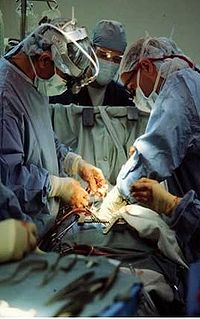
Photo from wikipedia
PurposeThe purposes of this study were to identify the reasons for delayed surgery following hip fractures and analyze the impact of these reasons on 1-year mortality.MethodsA prospective cohort study of… Click to show full abstract
PurposeThe purposes of this study were to identify the reasons for delayed surgery following hip fractures and analyze the impact of these reasons on 1-year mortality.MethodsA prospective cohort study of 1234 patients with mean age of 83.1 (range 65–92, SD 8.0) who underwent hip fracture surgery compared three subgroups: (1) surgery within two days from admission (609 patients); (2) delayed surgery for medical reasons (286); and (3) delayed surgery for organizational causes (339). Medical reason was defined as the need of medical optimization of the patient prior to surgery. Pre-operative assessment was performed by the American Society of Anesthesiologists (ASA) score, Charlson Comorbidity Index (CCI), Hodkinson mental status, Katz index for activities of daily living, and Short-Form (SF-12) questionnaire. Univariate analyses were used (chi-square and Fisher exact or Mantel-Haenszel tests for categorical data, and variance analysis, Student t test, or Mann-Whitney U test for continuous data). Logistic regression models were used for influence of variables on complications and one year mortality.ResultsThere were no significant differences in complications or one year mortality rates between patients with surgery within two days and those with delayed surgery for medical reasons. However, the patients with delayed surgery for organizational causes had significant higher rates of both complications and one year mortality compared to the other two groups (p = 0.001).ConclusionsThis study suggests that waiting time for hip fracture surgery more than two days was not associated with higher complication or mortality rate if waiting was to stabilize patients with active comorbidities at admission, compared to stable patients at admission with early surgery. Although early surgery within two days from admission is desirable for stable patients at admission, in patients with complex comorbidities, the surgery should be performed once they are optimized. However, the patients with delayed surgery for organizational reasons had a significant higher rate of post-operative complications and one year mortality compared to the other two groups.
Journal Title: International Orthopaedics
Year Published: 2018
Link to full text (if available)
Share on Social Media: Sign Up to like & get
recommendations!